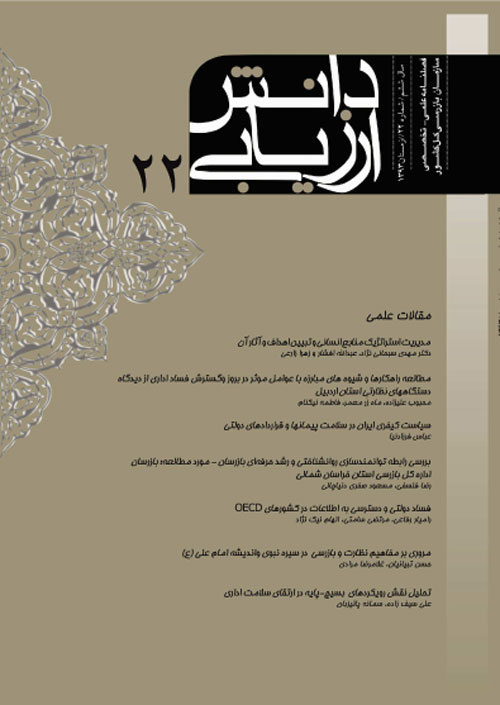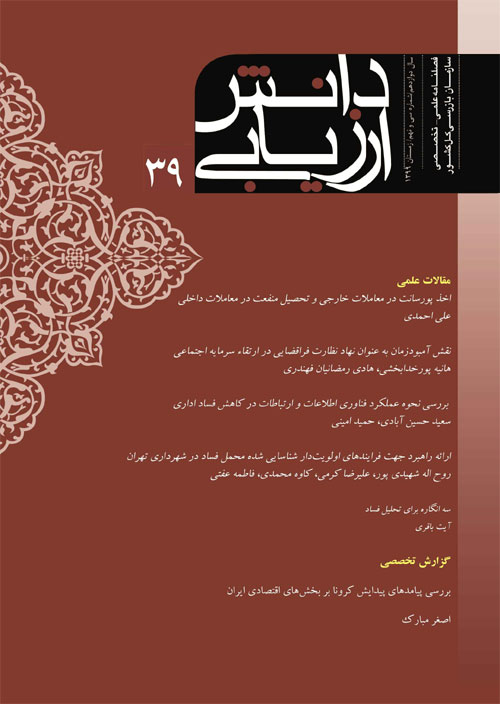فهرست مطالب

فصلنامه دانش ارزیابی
پیاپی 22 (زمستان 1393)
- تاریخ انتشار: 1393/12/15
- تعداد عناوین: 8
-
صفحه 1
-
بررسی رابطه توانمندسازی روانشناختی و رشد حرفه ای بازرسان / مورد مطالعه: بازرسان اداره کل بازرسی استان خراسان شمالیصفحه 73
-
Page 5Human resource management is a subset of management in general sense that its purpose is to manage the employees as the valuable organizational assets to achieve competitive advantages. Today, because of the magnitude of the discipline, it has been divided into different types of micro, Strategic and International with almost same functional tasks and operations. But they differ in the way of implementation, the number of manpower covered and etc. This paper attempts to describe the objectives and results of the strategic management of human resources. The method of the research is analyzing documents. To gather the necessary information, available documents and related Data using the form were collected. Research findings indicate that strategic human resource management is a planned model of human resource activities designed to achieve its objectives planned for arrangements and human resources activities that In order to empower the organization to achieve its objectives have been developed.- The main goal of strategic human resource management is implementation a series of activities and processes in order to achieve sustainable competitive advantages through human
-
Page 19In this study we have identified four factors (Organizational culture, organizational structure, rules and regulations, staff welfare and legal issues) influencing the incidence of corruption and how to fight it and finally, same implementation strategies have been stated. For this purpose, a questionnaire was prepared and distributed among control agencies of Ardebil province. Using inferential method, Hypotheses in this test is defined. After testing data, to determine the reliability of it, Cronbach method was used. Inferential analysis results indicate that Welfare and legal issues with an impact of 78%, had the largest and the rules and regulations had the lowest with 23%. Thus, taking into consideration other factors in the next ranks, to reduce corruption, we need the most attention to be paid to staff welfare and legal issues and Organizational culture.
-
Page 47High volume of state transactions in Iran has made this type of transactions as one of the vulnerable and crime-prone areas in Iranian administrative system. This vulnerability is the main reason for approval of numerous criminal regulations about state transactions through which, those who have committed an offense during state transactions such as state tenders and bids and have caused a loss to state properties will be prosecuted criminally. Unfortunately heterogeneous and distributed financial and transaction rules and regulations – approved generally according to desire of different executive organizations in order to provide their specific organizational advantages – and lack of comprehensive financial rules especially for tenders have made ineffective the criminal law governing these transactions. The inefficiency of existing criminal law including Collusion in State Transactions Punishment Single Article approved in 1969 should not be neglected since has no commensurability with development of Iranian financial system. Given that the Islamic Iran is seen as a developing country and this feature is one of the most important components for development of state contracts and treaties, and a great volume of crimes and offenses is committed while their execution; therefore, the approach of criminal law and courts toward this subject is a very important matter being discussed in this study in details.Keywords: Penal Policy, Crime, Punishment, Treaty, Contract, State
-
Page 73The main hypothesis of this study is: the existence of relationship between psychological empowerment and Professional development of inspectors. The research is descriptive and correlational. The population includes all inspectors of north khorasan province. The standard questionnaire was used to collect data that has 30 five choice questions (Likert scale). The data analysis software is SPSS and descriptive and inferential statistics were used. The findings indicate that there is a direct and meaningful relationship between empowerment and professional growth inspectors. Secondary research results also indicate that there is a relationship between competence, autonomy, effectiveness, meaningfulness and trust and professional growth inspectors.
-
Page 103Governmental corruption is the result of various factors such as economic, institutional, political and social factors. This study examined the relationship between Governmental corruption and Information in OECD countries. Using a panel approach and for the period 2000-2012, Model of governmental corruption has been examined. The main empirical findings in this study indicate that greater access to information can largely reduce corruption in society. The most important theoretical propositions of this study suggest that access to information via the Internet should be able to inform Ordinary citizens of Economic activity, public and private business. Another result is that the creation of an open and liberal society may reduces corruption.
-
Page 119According to Islamic teachings, Supervision can be used to achieve the goals of Islam. In modern management, supervision and control are also among the four pillars of management and directors have always benefited from this important means to reach their purposes. This paper has been presented in three parts: The first part discusses the place of supervision and inspection in the management. In the second part, the monitoring of human performance as a divine tradition have been considered And the third part refers to some orders and teachings of prophet and Imam Ali.
-
Page 135Corruption is a result of numerous factors whose consequences for society are immense. The continuity of Corruption reduces the social prestige and dignity of the Administrative system and causes a loss of trust and respect of the people to the government. Basij rooted in the goals and ideals of the Islamic Revolution can be described as an executive arm of government to achieve the value-oriented goals. The main objective of this paper is to analyze the role of Basij militia in controlling the financial and administrative corruption. in this article three role of Basij militia in the prevention of corruption and administrative reform, have been considered: The role of model presenting, The role of a deterrent agent and The role of reformation.


